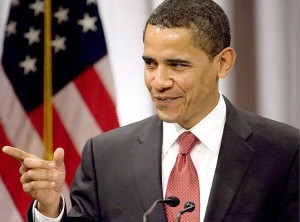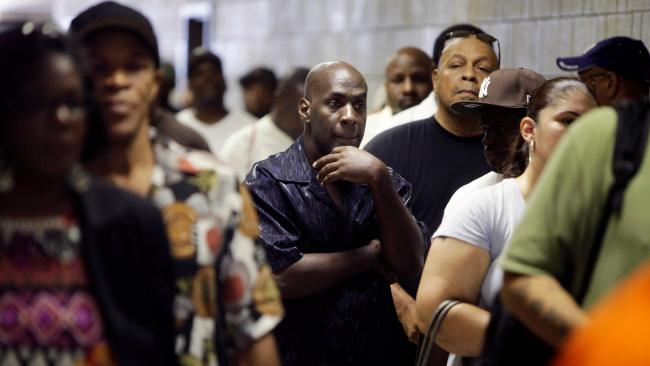(ThyBlackMan.com) Bill Keller strides back from his two week-old retirement as executive editor of the New York Times to pick up his pen today (Monday, September 19, 2011). He is searching for Barack.
Just last week, eerily, I did the same thing, but pointed to a different set of assumptions and reasons than the ones he gives. Bill Keller looks primarily at Barack. I looked at the reactions to Barack. Are they fair? What informs them? Bill Keller entitled his column, “Fill in the Blank.” My post (“Rhetorical Offensive“), a week ago, featured a fill-n-blank sentence: Barack is “_____ .” What would you put there? “White?”
That’s my point: the most important blank about Barack, the one everybody ignores but reacts to without acknowledgement is the blank everybody knows. Some presume indifference, others provoke denial, but the silence weighs in,  subtly influencing the public discourse. You can find Bill Keller’s column here. My answer, highlighted by Times editors, revised for 360*, follows.
subtly influencing the public discourse. You can find Bill Keller’s column here. My answer, highlighted by Times editors, revised for 360*, follows.
All four main reasons Bill Keller cites miss the silent cultural force that challenged and dogged Barack Obama’s election and now threatens to underwhelm his presidency. His election ginned up the divided attitudes W.E.B. DuBois described in 1902. The nation has a divided, contradictory consciousness about race. This uneasy divide is masked by a public dialogue that repeats assumptions about opportunity and fairness that put frank and honest discussion off limits.
The cultural symbols of our national ambivalence about race are constantly projected onto Barack and intrude even in the assessment of his supporters. Frank Rich early pointed out GOP recalcitrance included a fanatic cult of delegitimatization, politically signaled in cultural acts.The blocking and forgetting of Obama’s achievements are escorted by this parallel cultural narrative tied to a variety of messy, disjointed specifics: bullet sales (a 6 month order backlog right after his election!), inappropriate shouts (“you lie!”), labels of socialism, his birth place, his birth certificate, a bow, media parodies, his first day video for school-aged children; deliberate fear-mongering, disrespect (Romney”s “dog food,”), race and otherness (Muslim [by blood and faith], Kenyan anti-colonial, not black enough, elite, weak [read: impotent], “dark cloud”); incompetence (“he’s not up to the job,” “no adult in the room”), all negatives that resonate beyond politics but emanate from the confluence of deeply cherished notions of power and race.
The passive signals are the usual disclaimers and denials that race has no place within the criticisms and charges aimed at Barack. These denials ignore that race is seldom mentioned directly–expect to deny its influence and presence! The other passive signals include ridiculous analogies and comparisons, including David Brooks suggestion that Barack “transcend himself.” The refusal to credit Barack with bin Laden’s execution (a real chance to criticize his increased use of state sanctioned violence in place of due process) resulted in the internet joke that Obama is the only black man who had to prove he murdered somebody.
It’s a strangely American conceit, this race-whispering; denied, consigned to a fringe, or overlooked, but it has always been center stage in our history and folklore. To wit: Booker T. Washington, told by a Southerner that he was the greatest American, suggested the honor should go to Roosevelt, only to hear: “I once thought so until he invited you to dinner.”
This national failure, shouldered by Barack, begins with race, but it goes beyond race. I have tracked its cultural legacy beyond its confrontation with bias and injustice. Race, normally framed by these social paradigms (bias, justice), is emerging as a new paradigm, a paradigm of power that shows a range of ambivalence and hard edge. The new paradigm accomodates earlier social changes; it doesn’t support bias or injustice, but it surrounds the halls of American power to inform us about the humanity, status, and judgement of those who hold power and are racially different. This paradigm is not yet settled, but its outlines are forming, and its signals are easy to see.
Reagan signaled it when he failed to recognize his own HUD secretary Samuel Pierce at a White House reception, thinking he was a mayor, not a cabinet member. Purely on race, the Chicago City Council tried to nullify the mayorship of Harold Washington when he won election as the city’s first black mayor. Barbour, Gingrich, DeMint, Wilson and others have clearly signaled it by tone, reference, attitude, implication that Barack can’t be trusted, isn’t entitled, and is out-of-place. Hence, the nation shapeshifts on its legacy: what race means beyond bias. What race means to power. Many don’t see it: those who do are called hyper-sensitive. Its existence in the shadows doesn’t make it any less real.
Finally, the words of W.E.B. DuBois, who understood of how race, even in high places, narrows our view, reminds us why instead of dismissing it by its denial, there is a real reason to resist:
The main thing is the YOU beneath the clothes and skin–the ability to do, the will to conquer, the determination to understand and know this great, wonderful, curious world.”
Staff Writer; Walter Rhett
More articles by this brother can be found over at; Black History 360.
Also connect with him via Twitter; W. Rhett.

















Very interesting and thought provoking article.